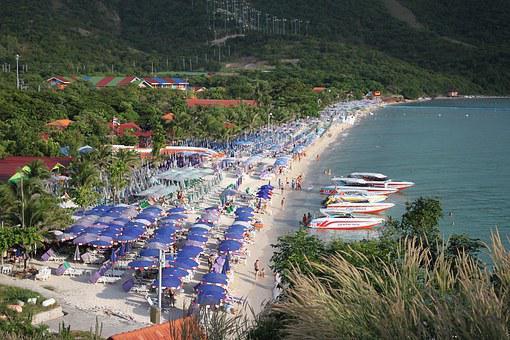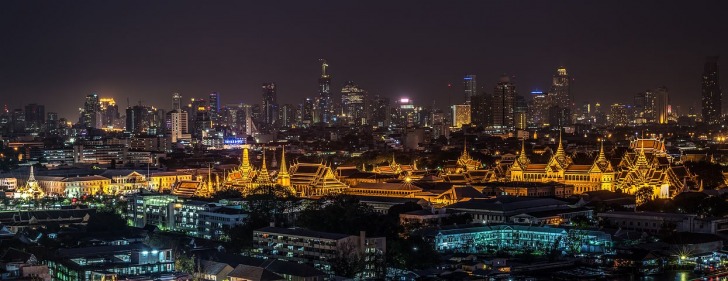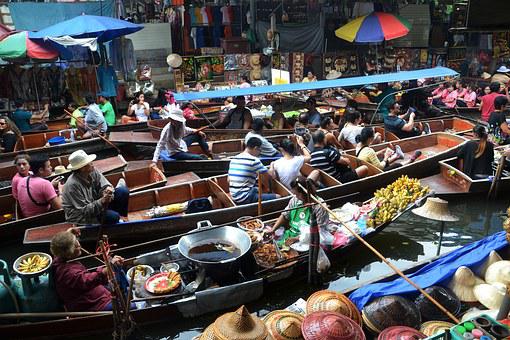Located in southeast Asia, Thailand has about 2,000 miles of beach land.
You can enjoy its sunny weather, white sand, and clear, blue-green waters any time of the year.
Learn the pros and cons of living here if you are looking for a change.

Contents
- Pros of Living in Thailand
- Cons of Living in Thailand
- 1. Missing/endangered Children
- 2. High-sodium Foods (Not All Though)
- 3. Strict Requirement Qualifications
- 4. Not All Days Are Sunny and Dry
- 5. Gun Deaths and Violence
- 6. Strict Vaccination Requirements
- 7. High Conflict Regions
- 8. Negative Attitudes Toward Visitors/Foreigners
- 9. Not Ideal for Left-Handed People
- Pros and Cons of Living in Thailand – Summary Table
- Thailand Safety Overview
- Frequently Asked Questions
Pros of Living in Thailand
1. Ranks High for Retirement Locations
One popular retirement location is Hau Hin on the western side of the Gulf of Thailand in the Prachuap Khiri Khan province.
Directly across from the Gulf, you will find Pattaya City and Chon Buri along the coast, which are only less than two hours and about an hour away from Bangkok.
Pattaya and Chon Buri are also less than an hour from one another.
You have the best of both worlds within reach – city life and beach life.
2. Ideal for Freelance Workers
Travelers often work to fund their trips while in Thailand, just like they would in any other country.
Some of them might even do their work on safe sections of the beach or while sipping a cocktail at an outdoor café or indoor lounge.
3. Unique Cuisine
Dishes you may want to try when you check out Thailand include Pad Thai and Tom Yum.
A significant characteristic of Thali cooking is the sweet and sour, sour and salty, and sweet and spicy contrasts.
Cooks also typically prepare meals with plenty of vegetables, so it is usually quite balanced.
You also can choose the appropriate spice grade for your taste buds at restaurants.
4. Relatively Safe
U.S. travelers who arrive in Thailand sometime before 2021 ranked the country the 20th safest country.
People perceiving it as safe include millennials and travelers with high incomes.
However, it did receive a Level 4 Do Not Travel rating from the U.S. State Department, but that was true of most locations from 2020-2021.
The highest crime rates usually happen in the places with the highest populations, but there is usually also more security and law enforcement too.
5. Plenty of Housing Options
Villas, block housing, and traditional homes would suit you if you are planning a long-term stay.
Depending on your resident status when you arrive, you may even buy a mainstream house.
Otherwise, you could pay for luxury hotels and resort accommodations, which usually cost less than in other parts of the world.
6. Vegetarians Fit Right In
You can find a vegetarian version of almost any dish made with meat, vegetables, and rice.
This would help you feel less out of place because you eat basically the same menu items as everyone else.
Tofu or other meat substitutes often come with vegetarian meals.
7. Friendly People
Although some locals might have negative attitudes about visitors, most residents will smile and welcome you.
In most cases, they will help you out any way they can, even if it’s just offering you the directions you need to find the assistance you are looking for.
When you come to Thailand, you probably will not feel alone.
It is an international social hub with people arriving from all over the world.
Some of them have come just to have fun, but others will arrive for business reasons, or they perhaps have decided to become ex-pats (long-term residents).
By the way, most ex-pats come from nearby or bordering countries, such as Myanmar, Vietnam, Laos, or Cambodia.
However, people from China, Japan, the U.S., several countries in Europe, and other locations.
Cons of Living in Thailand
1. Missing/endangered Children
Thailand is relatively safe in areas that also have enough police protection.
However, you do also experience a high risk of child abduction if you bring your children anywhere crowds of people are.
You might want to use the wrist leashes to be safe, and not ever leave your child unattended.
Some young children might run off and end up lost, so you might want to install tracking devices on them and plan a means of finding one another if this happens.
2. High-sodium Foods (Not All Though)
Thai food, like most Asian dishes, sometimes has a high level of MSG in it.
It is a type of sodium that can cause high blood pressure and cardiovascular problems.
Moreover, MSG may cause headaches, nausea, flushing, tingling, drowsiness, and more.
In addition, you could experience allergic skin reactions.
However, that could be because of the preservatives found in most dried and prepackaged foods or the presence of gluten in noodles and bread.
3. Strict Requirement Qualifications
You need to make at least 65,000 baht per month as of 2018 to retire in Thailand.
That is an average of about $2,000 United States Dollars (USD) per month.
You have another option, which would involve accumulating 800,000 baht in a Thai bank account, which equals about $25,000 USD.
4. Not All Days Are Sunny and Dry
You wouldn’t have to worry about shoveling snow if you lived in Thailand.
However, during some of the times of the year when it typically does snow in other countries, it rains quite a bit here.
If it is not raining, the 100-degree Fahrenheit temperatures at almost 100% humidity will make you wish it would rain.
However, it might not rain for several weeks.
5. Gun Deaths and Violence
In 2016, Thailand had 4.45 gun-related deaths per 100,000.
This comes in at much higher than Cambodia, Myanmar, Malaysia, and Singapore, which had less than one death per 100K.
Indonesia also is less violent at .10.
The gun death rate at this time, however, came in much lower than for the Philippines (7.42 per 100K).
It also measured a little more than the U.S., which at that time totaled 3.85 per 100K.
In 2022, murder rates totaled 5.9 per 100K, and intentional homicide rates marked at 4.8 per 100K.
Keep in mind not all killings happen with a gun.
6. Strict Vaccination Requirements
Strict vaccination requirements do not just refer to receiving the Covid-19 vaccinations.
Although not all may be mandatory, the Center for Disease Control and the Thai government recommends that you confirm receipt of the following vaccines:
Hepatitis A, tetanus, typhoid, varicella, MMR, DTAP, and polio.
You also may want to protect yourself from Hepatitis B, malaria, and Japanese encephalitis.
7. High Conflict Regions
Some talk of peace did occur in 2021.
However, Thailand has a long way to go before resolving all its political issues that have caused violence as early as the 1960s.
Democracy protests organized by the youth, for instance, signal their three-finger solute.
This signifies their stand for monarchy reform.
This in and of itself may not be dangerous, except that thousands and thousands of protesters crowded the streets.
Then, protester harassment and violence started to happen, which slowed down during the 2020 pandemic and lockdowns.
Violent conflict with weapons has also occurred in the southern Thailand provinces of Songkhla, Yala, Pattani, and Narathiwat.
The number of fatalities declined in 2021 after the Covid-19 assistance started to take place.
Before that, the death toll since 2004 reached more than 7,000.
Related to the southern border violence, the government did not take action against racial abuse, torture, and killings.
The only retribution loved one’s victims received was financial compensation.
Authorities also have over the years treated asylum workers as illegal immigrants.
Many of them ended up unlawfully arrested, detained, and deported.
8. Negative Attitudes Toward Visitors/Foreigners
It’s probably true no matter where you go.
Much of it relates to security issues and not knowing who to trust, especially in the areas where violent political demonstrations have occurred.
Sometimes, however, the attitudes may not be of fear but of disdain for littering in the streets.
Some resentment also occurs because apparently some visitors only care about “cheap shopping and idyllic beaches.”
Not respecting Thailand’s homeland and culture could also cause disgruntlement between locals and visitors.
That is why it is best to make sure you are familiar with customs, so you do not unnecessarily offend anyone.
Do not point at people or throw things, for instance, and try not to lose your temper when there.
9. Not Ideal for Left-Handed People
Left-handed people often must adapt to a right-handed computer mouse, and many of them can catch a ball with a right hand.
However, living in Thailand may cause them confusion and embarrassment for a while if they do not remember to pass objects at a restaurant with their right hand.
Apparently, the left hand is considered “unclean” in Thailand, and it must be placed on the forehead.
That shows everyone that you are using your right hand, which also is the one you would use to hand money to a sales clerk at a register.
If you are used to eating with your right hand, this could be a problem.

Pros and Cons of Living in Thailand – Summary Table
| Pros of Living in Thailand | Cons of Living in Thailand |
|---|---|
| 1. Ranks High for Retirement Locations | 1. Missing/endangered Children |
| 2. Ideal for Freelance Workers | 2. High-sodium Foods (Not All Though) |
| 3. Unique Cuisine | 3. Strict Requirement Qualifications |
| 4. Relatively Safe | 4. Not All Days Are Sunny and Dry |
| 5. Plenty of Housing Options | 5. Gun Deaths and Violence |
| 6. Vegetarians Fit Right In | 6. Strict Vaccination Requirements |
| 7. Friendly People | 7. High Conflict Regions |
| 8. An International Social Hub | 8. Negative Attitudes Toward Visitors/Foreigners |
| 9. Not Ideal for Left-Handed People |
Thailand Safety Overview
READ THE FULL REPORT: Thailand Safety Review
Safety Index:
- OVERALL RISK: LOW
- TRANSPORT & TAXIS RISK: MEDIUM
- PICKPOCKETS RISK: MEDIUM
- NATURAL DISASTERS RISK: MEDIUM
- MUGGING RISK: LOW
- TERRORISM RISK: MEDIUM
- SCAMS RISK: LOW
- WOMEN TRAVELERS RISK: LOW
Frequently Asked Questions
What should I know about Thai culture?
For starters, you will notice people making a prayer-like gesture called the “wai” by holding their hands facing one another in front of them.
If someone does that, it’s considered common etiquette to return the favor.
Other common Thai rituals include as follows:
- They eat with the spoon in the right hand and the fork in the left (even though overall the left hand is considered the “unclean one” and thought to be used when going to the toilet).
- A monk usually receives a higher “wai” than a random person on the street. They also eat first at gatherings and ceremonies.
- It is proper etiquette to always return a smile.
- Always remove your shoes at a local residence or in a temple.
Do you have to be a citizen to live in Thailand?
If you are just entering the country temporarily, you can acquire a visa for 60-90 days depending on your situation.
In some cases, you can extend your visa for up to one year.
In most cases, all you need is the visa or to apply for Permanent Resident Status for work and living.
What are the safest places in Thailand?
The large city of Chiang Mai and the resort town of Hua Hin are some of the safest places in the country.
You also might want to check out Krabi, known for its forests and mountains in addition to beaches.
Additional places, such as the island of Koh Samui and the mountainous city of Chiang Rai, are also rated safe.
Kanchanaburi, the origin of “The Bridge Over The River Kwai,” is also usually a safe place to be.
You will still have to check local crime reports before moving to one of these places, however, just so you are prepared.
How do I get a Thailand visa?
It depends on what kind of visa you want, such as retirement, work, or marriage visa.
If you are just checking out the place for the first time, you will need a tourist visa.
You will need to follow the instructions established by your country of birth.
For people born in the U.S., you should view this information before you apply for a visa.
Can retired people afford to live in Thailand?
It is possible to live on about $1,500 USD per month in Thailand as of 2022.
That is the standard Social Security retirement income, depending on how many years you worked and how much you earned.












Never heard of the left hand stuff and my wife is Thai and I lived there for 10 years.
Hindu culture to use right hand to give and receive, you use right hand to shake hands, it’s the same for other stuff as well…
Thailand has beautiful beaches, a unique cuisine, and friendly people, but there are also concerns about safety, strict requirements for living there, and cultural differences that may make it challenging for left-handed individuals.
Id like to visit Thailand, what city should I visit first… this will be my first vist.
Can I open a bank account before I move there?